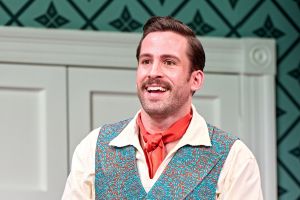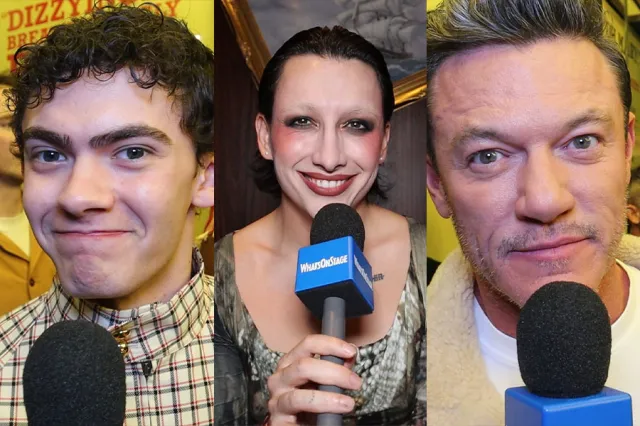Whishaw rules on screen
The BBC’s Hollow Crown series of Shakespeare histories had a hard time on Saturday night, launching against Andy Murray’s inevitably chaotic and nail-biting contest on Centre Court at Wimbledon. Which nervy old drama queen should command attention? Ben Whishaw‘s camp, capricious Richard II in Rupert Goold’s startling new film, or Handy Andy with his flouncing fusillade againt a hugely likeable Cypriot opponent?
Guess what? I watched both, hunkering down in my office with Ben on the telly and Andy live-streamed on my computer from Wimbledon on the BBC i-Player. It was a night of terrible tension, vitriolic volleys and shocking shake-downs.
For some all too obvious reasons, Goold had cast Ben as a Saint Sebastian freak and re-written the last few scenes of the play as a homoerotic pay-back with Aumerle shooting him full of arrows in the Tower (excuse me, it’s supposed to be Pomfret Castle).
Aside from that, and the incredible cutting of the line about England making a shameful conquest of itself in Patrick Stewart‘s brilliant delivery of the “sceptred isle” speech, this was a superb and compelling reading of the play. And the reinvention of treacherous Aumerle as a fair-weather loyalist – Tom Hughes, so handsome in the role, makes Robert Pattinson look like Jim Broadbent – reinvigorates the conspiracy plot.
Like Thea Sharrock‘s Henry V, it seems to be very slow at the start. But the pace becomes slowly hypnotic, as the speaking of the verse is so good and the casting almost flawless. David Morrissey is a brutish Northumberland, David Suchet a mesmerising Duke of York, James Purefoy an impassioned Norfolk, Lindsay Duncan a tumultuously irate mother of Aumerle.
And, unlike in Henry V, the soundtrack (by Adam Cork) is both atmospheric and discreet; it knows its place and when to shut up. Goold makes some breathtaking decisions, such as the filming of the entire sequence following Richard’s return from Ireland on the coast, with Whishaw’s headgear flapping in the wind like Peter O’Toole’s in Lawrence of Arabia, carving his name in the sand and telling sad stories of the death of kings in an elemental vacuum of sea and sky.
Whishaw’s Richard, one of the best I’ve seen, captures the king’s weakness and ambiguity in a cast iron sense of his own anointed destiny, the conflict between the man and his mission. The one outstanding quality we perceive in our current monarch is her sense of duty; with Richard, Whishaw most powerfully conveys his enchantment with the job, his ironic enslavement to its status.
He completely floors Rory Kinnear‘s bullish Bolingbroke with his playful abdication and submission. Never was a Richard more suited to seeing his future in a looking glass, and his self-consciousness in adopting various roles for himself makes the excess of the Saint Sebastian martyrdom not too risible. Not risible at all, now I think about it.
Harping on cuts, I was even more briefly despondent not to hear David Bradley’s grizzled old gardener instruct his sidekick to “bind thou up yond dangling apricocks.” But as the garden is a formal maze of manicured lawns and topiary, the command would have been superfluous. Shakespeare’s insistent imagery of an overweeded garden is undermined by the visual setting. Rupert Goold is too intelligent a director not to have thought of this himself. I’ll catch up later, but for the moment the point eludes me.
The two parts of Henry IV (directed by Richard Eyre) and Henry V are broadcast on the coming three Saturdays, but I look forward to seeing Henry IV on a large screen later this afternoon, and am intrigued to see how Rory Kinnear’s haunted Bolingbroke morphs into Jeremy Irons’ frail Henry; the monkey on his back in Richard II was Ben Whishaw’s, literally, a scratchy little simian who mocks the usurper even as his courtiers roll the heads of his opponents across the throne room and Aumerle drags Richard’s corpse in its coffin.
I’m almost as big a fan of Rufus Norris as I am of Rupert Goold but, oh dear, his production of Damon Albarn’s Dr Dee for ENO at the Coliseum is a real dog’s dinner. Its desperation no doubt stems from the thinness of the material, but its collection of design and visual cliches is obfuscatory rather than illuminating.
And, gosh, the music. It’s terrible. There’s absolutely no attempt to mould the troubador, guitar-plucking presence of Albarn on the stage into the overall production, exploit the clash between solo strummer and operatic orchestration. And Paul Hilton, usually a subtle and sympathetic actor, is simply dwarfed by his own legend as Dr Dee, a character who should be a spellbinding mix of Prospero, Galileo and Meatloaf. Here, he sounds like Rolf Harris on tranquilisers.












